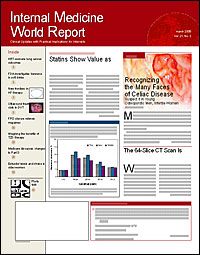Investigational Oral Vaccine for Enterotoxigenic E Coli
WASHINGTON, DC?An investigational oral vaccine, consisting of formalin-killed Escherichia coli whole cells expressing common colonization factor antigens plus the already available B-subunit of the cholera enterotoxin vaccine, Dukoral?which is approved in countries such as Canada and Sweden but not in the United States?has been found to be safe and effective protection against moderate-to-severe en?ter?o?toxigenic E coli (ETEC)-associated traveler's diarrhea, according to data presented at the ?annual meeting of the Interscience Conference on Anti?microbial Agents and Chemotherapy.
Protection was most evident in pa?tients who mounted the strongest immune response after immunization. Rates of moderate-to-severe ETEC illnesses were lower in this group, and when illness occurred, it was less severe than in patients given a placebo.
"We have a very promising, oral, inactive, whole-cell vaccine for ETEC, and it has been found to be safe and immunogenic in a number of phase 1 and 2 trials in the United States and Europe," said lead investigator A. Louis Bourgeois, PhD, of the Center for Immunization Research, Johns Hopkins Bloomberg School of Public Health, Baltimore. "The vaccine has been found to not only provide protection against disease, but [it] also modulated disease severity" in those who are ill.
As many as 50% of the estimated 60 million people who travel from industrialized countries to high-risk areas in the developing world have at least 1 episode of traveler's diarrhea during their journey. ETEC is responsible for an estimated 22% to 60% of all traveler's diarrhea cases. This translates into 7 million to 18 million cases annually.
Travelers acquire ETEC from contaminated food or water. The bacterium causes diarrhea by sticking to the surface of the gastrointestinal tract using ap?pendages called colonization factor antigens (CFAs) and by producing a heat-sensitive toxin called LT, a heat-stable toxin called ST, or both.
Currently, the only protection against ETEC is Dukoral. It provides short-term protection against ETEC strains that produce the LT toxin only or the LT toxin in combination with the ST toxin.
The new vaccine would increase the range of protection, according to Dr Bourgeois.
It will protect against both LT- and CFA-expressing ST toxin-producing ETEC strains that share CFAs with the vaccine.
It is given in a 2-dose regimen, 7 to 21 days apart. An initial field trial in Guatemala and Mexico determined that it was about 77% effective in preventing diarrhea, and among those who did acquire the E coli?induced diarrhea, the cases were relatively mild compared with those who received placebo.
In the most recent investigation, the efficacy of a vaccine lot made to full commercial scale was tested in a double-blind, randomized, placebo-controlled trial. A total of 1458 participants received the vaccine or a placebo, 1406 of whom traveled and completed 14 to 28 days of surveillance. The overall rate of traveler's diarrhea was 34% in those who went to Guatemala and 23% in those who went to Mexico. Vaccine "takes" based on serology showed that individuals who mounted a strong immune response to the vaccine had 84% less moderate-to-severe ETEC illnesses compared with those receiving placebo. When illness did occur, the duration was shorter, and overall symptom scores were lower compared with placebo recipients.
"It could be commercially available within the next 5 years, and it could be given as a first dose in the primary care physician's office. Then the individual could take the second dose in the home setting," Dr Bourgeois told IMWR.
In the current phase 3 trial, transient mild nausea and abdominal pain or cramps after dosing were seen with nearly equal frequency in the vaccine and placebo groups (10% vs 12%, respectively). The only side effect associated with the vaccine was single-episode vomiting, which affected only about 1% to 2% of the vaccinees and generally occurred shortly after dosing.
Dr Bourgeois noted that ETEC has historically been an important cause of traveler's diarrhea among US armed forces deployed to developing regions of the world. ETEC is also a major cause of diarrheal disease morbidity and mortality among young children in the developing world.
